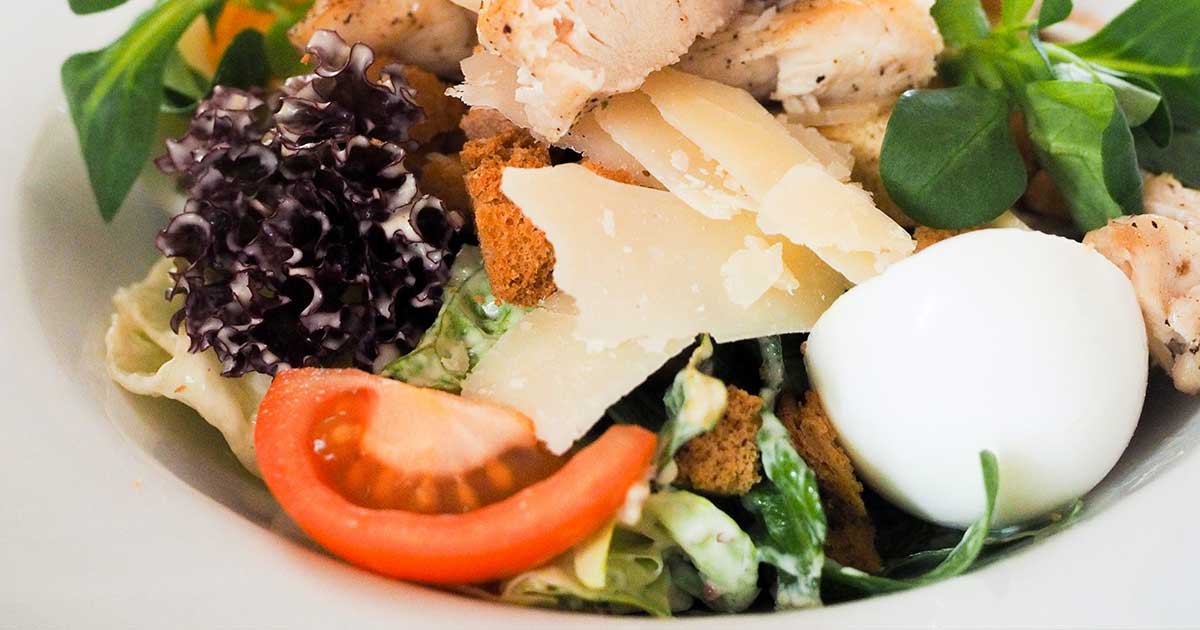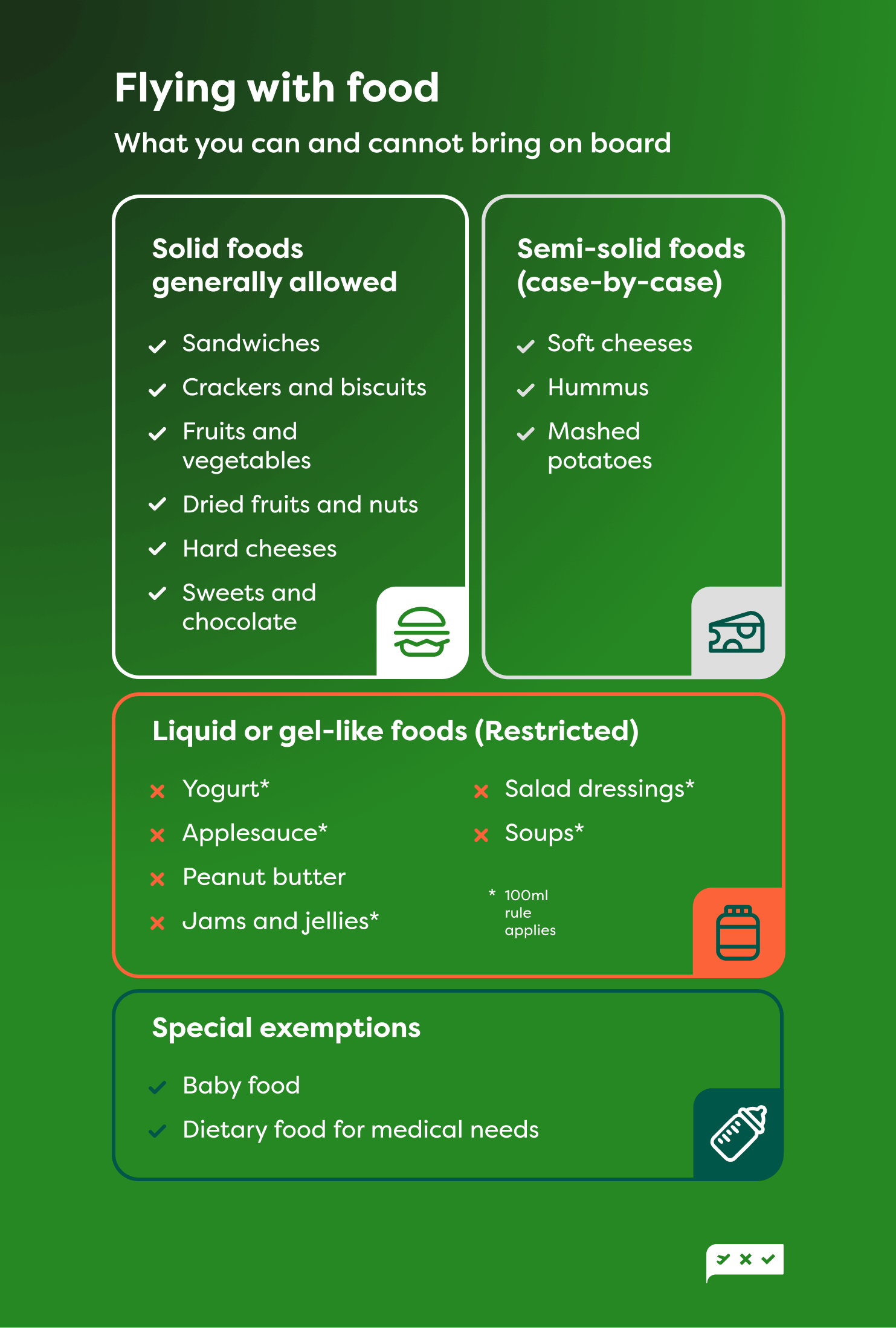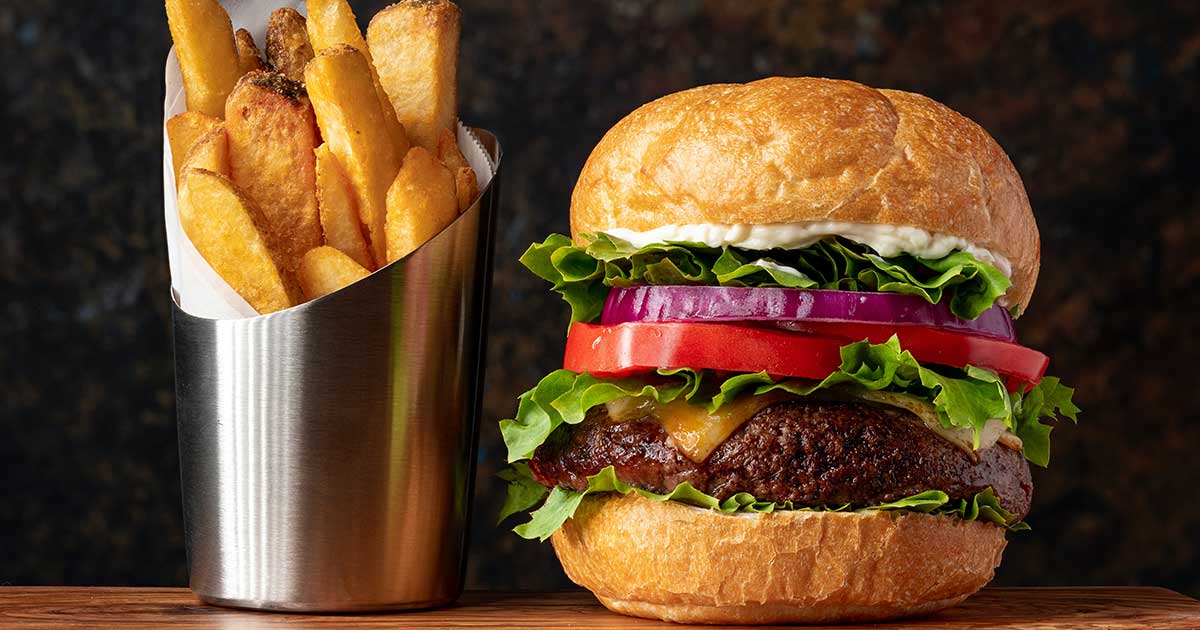The most important facts about “eating on the plane”
- It is generally permitted to take food with you, but only limited quantities of liquids and creams.
- Sharp and explosively dangerous objects and weapon-like utensils are prohibited.
- Disposable plastic cutlery and glass bottles should be avoided.
- Food in hand luggage must be hygienically packed.
- Passengers with special diets and allergies should inform the airline in advance.
- Drinks can be purchased locally or on the aircraft.
- Baby and infant food and medicines are permitted.
- Stricter regulations must be observed for flights to the USA.
- Airlines may have their own rules regarding the carriage of food.
- If in doubt, you should check with the airline in advance.
Did you have a flight delay or cancellation? Check your rights now and increase your chances of compensation
Aeroplane food is not exactly known for being high cuisine. So it’s no wonder if you, as a passenger, are considering taking food onto the aircraft. But is this actually allowed? The answer can be found in the following blog article.
Can I get through security with food?
Can I take food onto the aircraft? The answer is yes and no. Solid and dry food that is transported in a sealed and leak-proof container can usually be taken through security without any problems. Snacks in their original packaging may also be taken onto the aircraft. At least as long as they can be easily identified by security staff and are in airtight packaging.
Can I get through security with alcohol?
The temptation to take a bottle of champagne onto the plane can be very tempting, especially for people with a fear of flying. In this case, alcohol can calm the nerves a little. The good news is that alcoholic drinks can be taken on board under certain conditions.
The 100-1-1 rule applies to alcohol as it does to all other liquids.
If the alcoholic beverage of your choice contains more than 22% alcohol, you may neither stow it in your hand luggage (or travel rucksack) nor pack it in your suitcase.
You can therefore take a properly packaged glass of sparkling wine or wine with you. However, you should leave stronger, alcoholic drinks such as vodka or rum at home.
Important: The 100-1-1 rule states that you may only take 100 ml of liquid per container on board. In addition, these containers must be transported together in a transparent, resealable plastic bag with a maximum capacity of one litre. 100 ml, 1 container, 1 litre – i.e. 100-1-1.
Can I get through security with home-made food?

With home-made food, as with other snacks, solid and dry food can be taken through security without any problems as long as it is properly packaged. The decisive factor here is the consistency of the food you bring with you. Soups and stews are of course considered liquid. However, most air travellers should have no problem doing without a hot, home-made soup.
What food is allowed in hand baggage?
Permitted food
- Sandwiches (wrapped in transparent film or stored in a box)
- Fruit and salads
- Crisps, biscuits and other sweets such as chocolate bars
- Tea bags and instant drinks
Prohibited foods
- Jelly-like spreads such as jam, nut nougat creams, peanut butter in a jar, dips, ketchup, etc.
- Sauces, dressings
- High-proof alcohol
- Soup
Guidelines – this food is allowed on the aircraft

Most passengers are probably already familiar with the regulations regarding liquids. However, when it comes to bringing food on the plane, things can get a little confusing.
Not only the airlines and security officers, but also customs officials want to know what food you are taking on board in your hand luggage. If you are travelling within the EU, you only need to declare alcohol, tobacco and coffee. When travelling from the EU to a non-EU country or vice versa, meat, milk, cheese, eggs and other animal products can cause problems. There are both cultural and health reasons for this. Airlines often allow you to take food with you. However, you should preferably eat the food on the plane and not bring it into your destination country. The regulations for importing food into the USA are particularly strict.
Tip: If you want to bring food into the United States as a gift, for example, you should definitely enquire about the restrictions beforehand. Declare all the food you are bringing with you. Otherwise you could face severe penalties.
You don’t want to take food with you? – This is what meals cost with various airlines
- Lufthansa: Lufthansa welcomes its passengers on short flights of up to 30 minutes with chocolate. For flights up to 60 minutes, you will also receive a free bottle of water.
- Eurowings: Lufthansa subsidiary Eurowings offers passengers on short and medium-haul flights a free meal only in the expensive BizClass. With the Basic and Smart fares, snacks and drinks can be purchased on board. The situation is slightly different on long-haul flights. Here you get one hot and one cold meal and one drink free of charge in the standard economy fare Smart.
- Tuifly: Tuifly only offers travellers a very limited range of meals. The Perfect fare includes a snack and a non-alcoholic drink. In the cheapest Pure package you have to buy snacks and drinks yourself from 6.90 euros (equivalent to 5.95 pounds).
- Ryanair: With the Irish low-cost airline Ryanair, you do not get free catering on board. On the aircraft, for example, you can buy a menu consisting of a snack, a drink and a main course for 10 euros (equivalent to 8.62 pounds). On certain flights, you can also pre-order special meals, such as a breakfast package.
Can I take fresh food with me on the plane?
Many people don’t trust food on aeroplanes. So eating your own food on the plane is a good alternative.
Fresh food such as raw meat, fresh fruit, vegetables, seafood or eggs are normally allowed in hand luggage. At least if they are sealed so that no odours or liquids can escape.
However, these regulations only apply to domestic flights – on international flights, the regulations for importing fresh food, especially fruit and vegetables, are very strict. The reason for this is that pests or diseases can be imported into the destination country with these foods.
Tip: Always check with customs first if you are planning to take fresh food onto the aircraft.
How much food can I take on the plane?
You now know under what circumstances you can take food onto the aircraft. But how much food can you take with you in your hand luggage?
In the case of fruit and vegetables, generally everything is allowed. In the case of liquid and jelly-like foods, such as honey, as with other liquids, up to 100 ml is permitted and must therefore be carried in a transparent bag with a maximum capacity of one litre.
Which foods are prohibited on aeroplanes?
If you are travelling within the EU, you are allowed to carry meat or dairy products in your hand luggage. At least as long as they are intended for your consumption. This rule applies to both plants and plant products. When travelling outside the EU, you should always enquire about the import regulations of your destination country.
What if I need to take food for my baby or medication with me?
Food for children on an aeroplane is a special matter. Especially when it comes to baby food. But don’t worry. If you are travelling with a child up to two years old, airlines allow you to bring your food for the little ones. And in the quantity required.
Please note: even if it is only baby food or powder, this must be declared to customs. This way you can avoid being detained.
Baby food, breast milk, distilled water and other baby products are exempt from the 100-1-1 rule. Nevertheless, the food should be kept easily accessible as it is likely to be tested again separately. Expect security personnel to open and inspect the containers. Also, do not take more baby food on board than you need for the journey.
Why does food taste different on aeroplanes?
The bad reputation of aeroplane food is only partly justified. Food on a plane often doesn’t taste good because the change in air pressure affects the sense of smell and taste.
Is water allowed on the plane?
Yes, it is permitted to take water onto the aircraft as long as certain conditions are met. As a rule, passengers are allowed to carry water in containers of up to 100 millilitres. These containers must be stowed in a transparent, resealable plastic bag with a maximum volume of one litre. As a rule, one such bag is permitted per passenger.
However, it is important to note that the regulations may vary depending on the airline and country. It is therefore advisable to check the specific guidelines of the airline and the country of departure to ensure that you comply with the current regulations.
Can I take empty bottles onto the aircraft?
Yes, it is generally permitted to take empty bottles onto the aircraft. The security regulations for liquids apply primarily to full containers. However, you must ensure that the bottles are truly empty, as airport security checks can be carried out to ensure that no prohibited substances are smuggled in empty containers. It is also possible to take empty resealable bottles with you to refill them with liquids after the security check. However, it is advisable to check the specific security regulations of the airline and destination airport before travelling, as these may vary slightly.
How can we help you?
Everything is fine with your hand luggage, but the airline is standing in the way of your holiday happiness. Your flight is overbooked, delayed or cancelled? Has your baggage been delayed or lost?
Tip: Flightright can help you enforce your passenger rights! You can check your claims with us free of charge.
As experts in the field of air passenger rights, we enforce your right to compensation against the airline!

